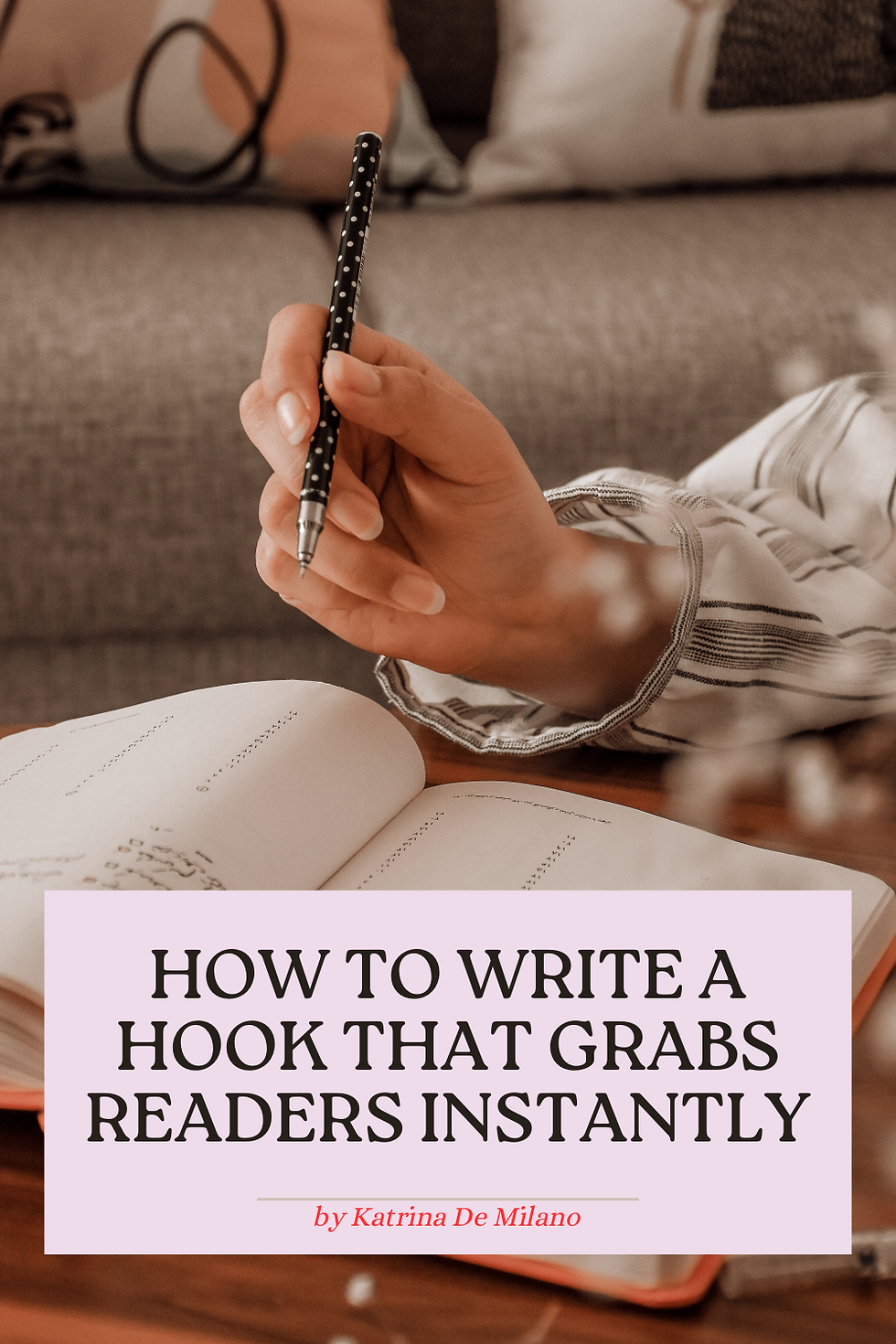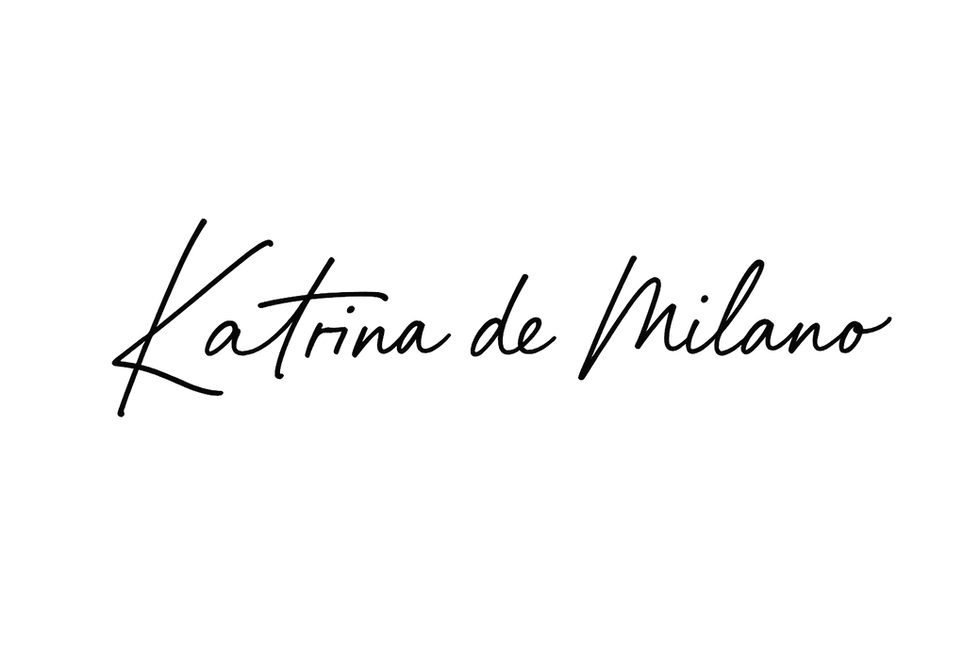🎣 How to Write a Hook That Makes Readers Keep Turning the Page
- Katrina De Milano

- 6 авг. 2025 г.
- 4 мин. чтения
Because your first line isn’t just a sentence — it’s a promise.
Let’s be honest: readers today are drowning in options. writing hooks for novels
Your book isn’t just competing with other books.
It’s competing with Netflix, TikTok, breaking news, inboxes, and an endless scroll of distraction.
That’s why your opening line matters more than ever.
It doesn’t just need to introduce the story — it needs to seduce the reader.
To spark curiosity. To create tension. To make a quiet, unshakable promise:
“Stay with me — and I’ll take you somewhere unforgettable.”
A great hook isn’t loud, but it lingers.
It stays in the reader’s mind long after they’ve moved on to the next paragraph — or the next book.
So how do you write one?
🪝 What Makes a Great Hook?
The best hooks don’t just ask for attention — they earn it.
They raise a question you can’t answer yet.
They reveal a unique voice you instantly want to hear more from.
They drop the reader into a moment that feels slightly off, slightly urgent — and impossible to walk away from.
Not every great hook is explosive.
Some are strange. Some are quiet. Some feel like a whisper that turns into thunder the longer you sit with it.
But all of them do one thing:
They make the reader want the next line.
🔍 1. Start with Mystery or Movement
Avoid beginning with exposition, backstory, or a slow pan of your fictional world.
Start in motion — in a moment that feels tense, unusual, or quietly wrong.
📚 Example:
“It was a bright cold day in April, and the clocks were striking thirteen.” — 1984 by George Orwell
In just one line, Orwell signals that something is off.
Something is broken in this world — and we need to know what.
📚 Another:
“I am an invisible man.” — Invisible Man by Ralph Ellison
Is it literal? Metaphorical? Existential?
The sentence opens a door, and the reader walks through it without hesitation.
🪄 Try this:
Begin with an image, a moment, or a line that unsettles — something that makes the reader pause and say: “Wait… what’s going on here?”
💔 2. Lead with Emotion — Especially If It’s Complicated
Readers don’t just crave plot — they crave feeling.
If your opening line carries emotional weight, it doesn’t need spectacle to be memorable.
📚 Example:
“All this happened, more or less.” — Slaughterhouse-Five by Kurt Vonnegut
It sounds offhand, almost casual — but under the surface, it suggests trauma, memory, and blurred reality. It whispers that this story will hurt, and we want to know how.
📚 Another:
“I did not kill my father, but I sometimes felt I had helped him on his way.” — The Poisonwood Bible by Barbara Kingsolver
Guilt, grief, and confession — all in one line. We’re hooked.
🪄 Try this:
Ask yourself: what is the most emotionally honest sentence your character could say — even if they’d never admit it out loud?
Start there.
🗣️ 3. Use Voice as a Weapon
Sometimes, you don’t need action or emotion in the first line.
Sometimes, voice is enough to make the reader stay.
📚 Example:
“You better not never tell nobody but God.” — The Color Purple by Alice Walker
We don’t know the setting or the stakes.
But we know the narrator. We hear her instantly. And we trust her to take us somewhere true.
📚 Another:
“I write this sitting in the kitchen sink.” — I Capture the Castle by Dodie Smith
It’s odd, charming, a little sad — and completely unforgettable.
🪄 Ask Yourself:
If a reader only had your first sentence to go on, would they hear your narrator’s soul in it?
❓ 4. Raise Quiet Questions writing hooks for novels
Not every hook needs to scream.
Some are powerful precisely because they plant a seed — and let it grow slowly in the reader’s mind.
📚 Example:
“The man in black fled across the desert, and the gunslinger followed.” — The Gunslinger by Stephen King
We don’t know who they are.
We don’t know why one is fleeing or the other chasing.
But we have to find out.
📚 Another:
“I had just come to accept that my life would be ordinary when extraordinary things began to happen.” — Miss Peregrine’s Home for Peculiar Children by Ransom Riggs
That’s not just a sentence. It’s a promise. And we’re already invested.
✍️ Bonus Hook Prompts to Try:
A memory that still haunts your narrator
A line they regret saying — or never got to say
A contradiction: “I loved her. I didn’t trust her.”
A rule being broken in real time
A truth no one else believes — but they do
💬 Final Thoughts
You don’t have to write the perfect opening line.
But you do need to write one that feels alive.
Ask yourself:
Does it carry tension, voice, or emotion?
Does it reveal something essential — even if only a sliver?
Does it pull the reader forward, even just a single step?
If the answer is yes — you’ve already done what matters most.
Because the strongest hooks don’t shout.
They whisper something your reader can’t forget.







Комментарии